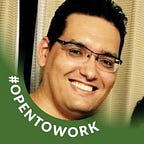Overcoming crises
A lesson hidden in the steward’s parable
Crises tend to paralyze us, regardless of whether they are personal or global crises, like the current pandemic situation. I have to admit that I was facing a crisis and, therefore, I was not able to write here on Medium. However, I am better now, thank God!
What also helped me to overcome crises was the study of the following Bible passage:
He told His disciples: “There was a rich man who had a steward who was accused to the man of wasting his resources. So he called him and said, ‘How is it that I hear this about you? Give an account of your stewardship, for you may no longer be steward.’
“Then the steward said to himself, ‘What shall I do, for my master is taking away the stewardship from me? I cannot dig. I am ashamed to beg. I know what to do so that, when I am removed from the stewardship, others may receive me into their houses.’
“So he called each of his master’s debtors, and said to the first, ‘How much do you owe my master?’
“He said, ‘Eight hundred gallons of oil.’
“He said to him, ‘Take your bill, and sit down quickly and write four hundred.’
“Then he said to another, ‘And how much do you owe?’
“He said, ‘One thousand bushels of wheat.’
“He said to him, ‘Take your bill, and write eight hundred.’
“The master commended the dishonest steward, because he had acted prudently. For the sons of this world are wiser in their own generation than the sons of light.”Luke 16:1–8, Modern English Version
In this text, I was able to extract the following lesson to overcome crises:
1) Be aware of the crisis
The steward was fired from his job for his dishonesty, but he did not pretend that nothing was happening or deceived himself. Before, he understood his reality and adapted to the situation.
2) Know yourself
The steward knew his limitations — in this case, he had no physical structure to work with agriculture. Understand limitations as those that are natural to a person (for example, a shy person trying to speak to a large audience), and not the self-imposed (such as not wanting to eat something, but never having experienced it).
Consequently, the steward also knew his strengths — dealing with finances and people.
3) Not following the path of victimism
The steward firmly stated that he would not beg for shame. Some people in crisis see themselves as poor people, victims of the universe’s conspiracy against them. As much as crises can shake, we must never embrace victimism.
Note that it does not refer to asking people for help. On the contrary, we should rather cry out for help to those who can assist us, and also be reciprocal with those who need it.
4) Talk with your contacts
The steward used his networking (his former boss’s debtors) to get out of the crisis. Everyone has at least one acquaintance they can contact.
5) Give your best shot
The steward used his knowledge by charging his former boss’s debtors the actual amounts — which gave the impression of a generous discount on debts.
Everyone is good at at least one thing in life. This resource (or set of resources) is what will help you to get out of the crisis.
6) Get the results
The steward was welcomed by the people who owed his former boss for his “generosity”, and the boss himself praised him. Your well-used actions against crises will surely bring you victories.
7) Do not cause crises in others to get rid of their own crises
Jesus said that people who do not live in the light are smarter than those who live in the light because, generally, those who are bad will do anything to get rid of a crisis, even if they have to harm other people. We must have cleverness as the steward, but without using it for evil.
So I finish this post. Going well, next week I’ll publish another text. So, see you next time!
